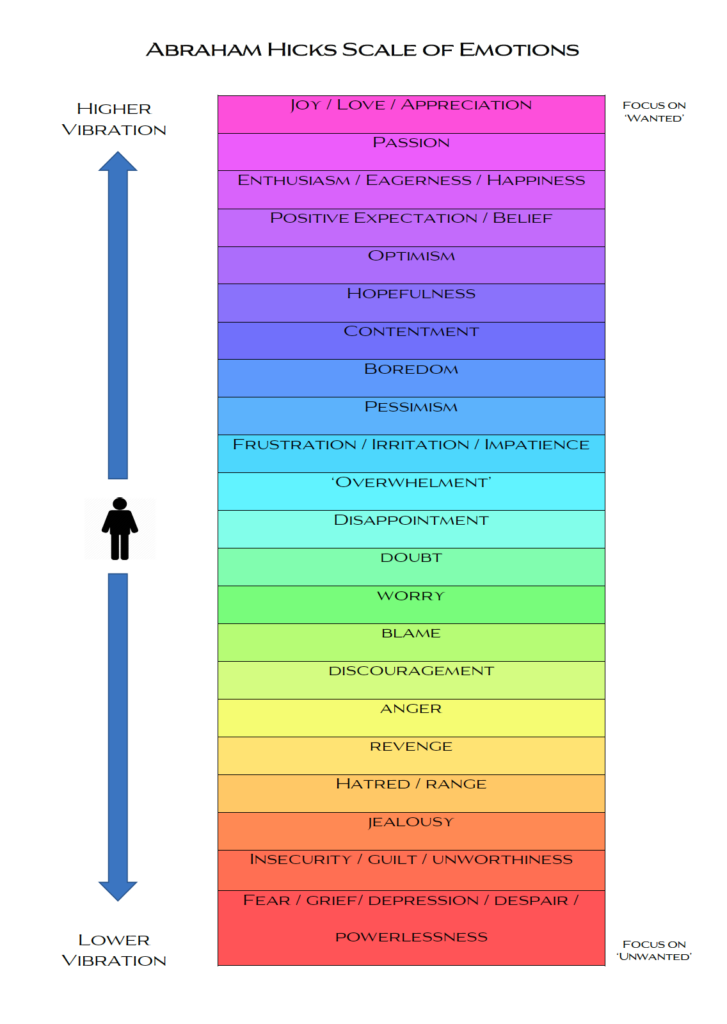
How to Move Up from Feeling Depressed?
If you’ve ever felt depressed, you know how hard it is to go from feeling really down to feeling happy and joyful.
Sometimes it takes all of one’s energy, courage and strength just to get out of bed in the morning.
As we can see from the Abraham Hicks Scale of Emotions, there’s a lot of emotions in between joy and depression, which is why it is so challenging to move up from feeling depressed.
How Can We Move Ourselves or Help Our Kids Move Up the Ladder of Emotions?
Nowadays, the expression “It’s the little things” is popular, and resonating with many because it’s the truth.
If we can find just one little thing that brings us joy, then we can move up the scale a little.
Suggestions:
- play uplifting or calming music (note – many depressed teens listen to very dark music which further adds to their low mood)
- play an intstrument
- dance
- go for a walk
- do a jigsaw puzzle
- draw or write
- craft
- read
- create
- cook healthy recipes
- play with your child
- connect with your teen
- hug a pet
- be of service to others – who can you reach out to? A stranger, an organization or a neighbour, friend or family member?
- watch an uplifting movie and wrap yourself in a warm, cozy blanket
- have a bubble bath
- light a candle
- set up an essential oil diffuser
- listen to a meditation
- participate in a Youtube yoga class
Focus on Behaviour Activation to Move Up from Feeling Depressed
Behavioural Activation is a strategy that is often used in counselling to help with depression.
The concept is that we can’t wait to feel better to then do the things that we used to enjoy.
Instead, we need to choose one or two small, positive actions to carry out, even if we don’t feel like doing them.
By activating ourselves to do these small things, it in turn helps us to feel better.
Every day, little by little, we try to focus on the small things that bring us joy.
This 2019 study studied older adults with depression who participated in a treatment model called “Engage,” which included behavioral activation. The participants either did solitary activities, activities with one other person, or group social activities. The results endorsed that participating in rewarding activities improved symptoms of depression. Interestingly, the group that engaged in 1:1 activities showed the most improvements which seems to suggest that the deeper 1;1 connection time is the most beneficial and therapeutic.
Although this study focussed on senior adults, it makes sense for all of us, including our kids and teens.
Our thoughts do create our feelings which create our actions but then the circle continues and our actions influence our thoughts which creates our feelings.
We often set lofty goals that we wish to achieve but may not be realistic at this present time. Instead, it’s more beneficial to focus on the little things and do one little thing at a time.
Referring to the Scale of Emotions
By noticing our feelings we can check-in on the scale of emotions to understand ourselves better.
For example, if we’re feeling jealous that everyone on social media seems to have a better life than us, we may soon start to feel angry. This is actually good news. It’s better to have energy and be angry than to be energy-less and in a state of despair.
As we work through our anger, we may feel discouragement, blame, worry, doubt, disappointment, overwhelm and that’s okay. As we experience these emotions, we are actually moving up the emotional ladder.
From a place of overwhelm, frustration and pessimism, we may try to do just one small thing that takes us out of our boredom for a short period and suddenly there is a small feeling of contentment. Even it it’s just a fleeting moment, it gives us hope which helps us feel more optimistic and leads to the belief that we can feel positive again… From there, the feelings of happiness, passion, joy, love, appreciation have more opportunity to seep in.
The Importance of Appreciation to Move Up from Feeling Depressed
We’ve all heard that the practice of gratitude is really important, and seeing it at the top of the Scale of Emotions validates that too.
“What we focus on grows” and so it’s important to find the little things, for which we’re grateful and acknowledge the people in our lives who make a difference – sometimes more than they realize, until we tell them.
Whatever is going on for you in your life, I hope that you can take some steps to bringing yourself little moments of joy. I also hope you can share your appreciation and gratitude for others with them.
I’m very grateful to this community and all the positive messages I receive. Knowing that my blog posts, may help just one person, is enough to keep me writing and sharing the lessons I’ve learned and the knowledge I gain through my professional and personal life.
Wishing you and yours, peace, love and joy this holiday season.
Warmly,

PS. If you and your child need support managing anxiety, please go to my “groups” page to see how I can support you. All my children’s groups include a parent portion for 15 minutes at the end of each session so that you get support too.
Want to Connect?
Subscribe now to receive free weekly parenting tips and inspiration.






